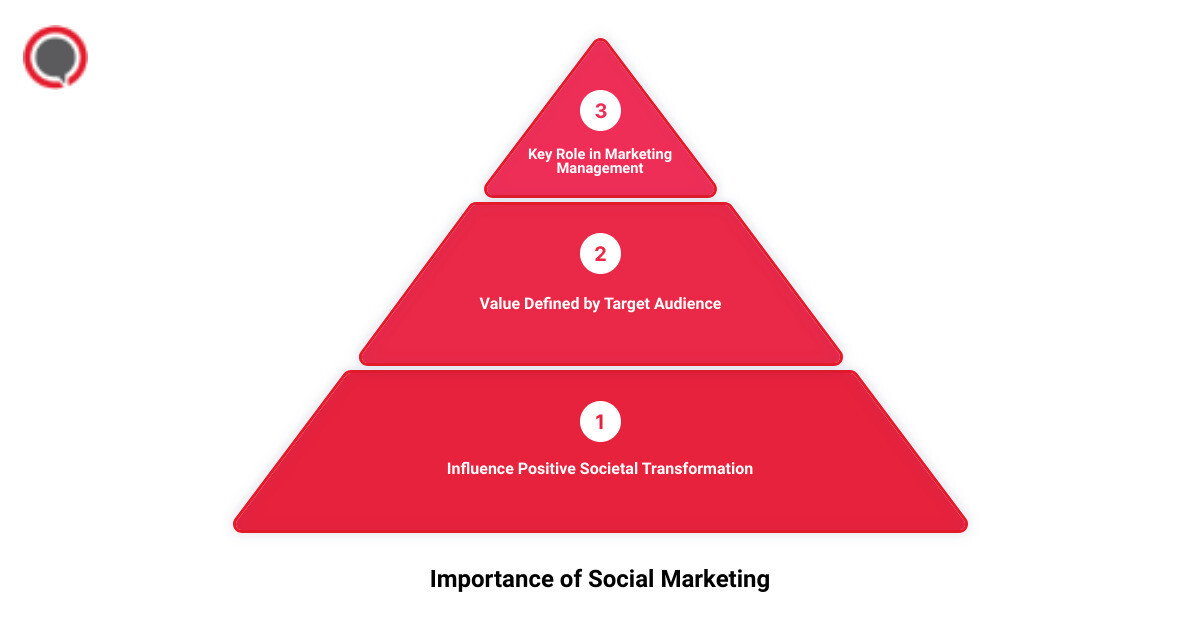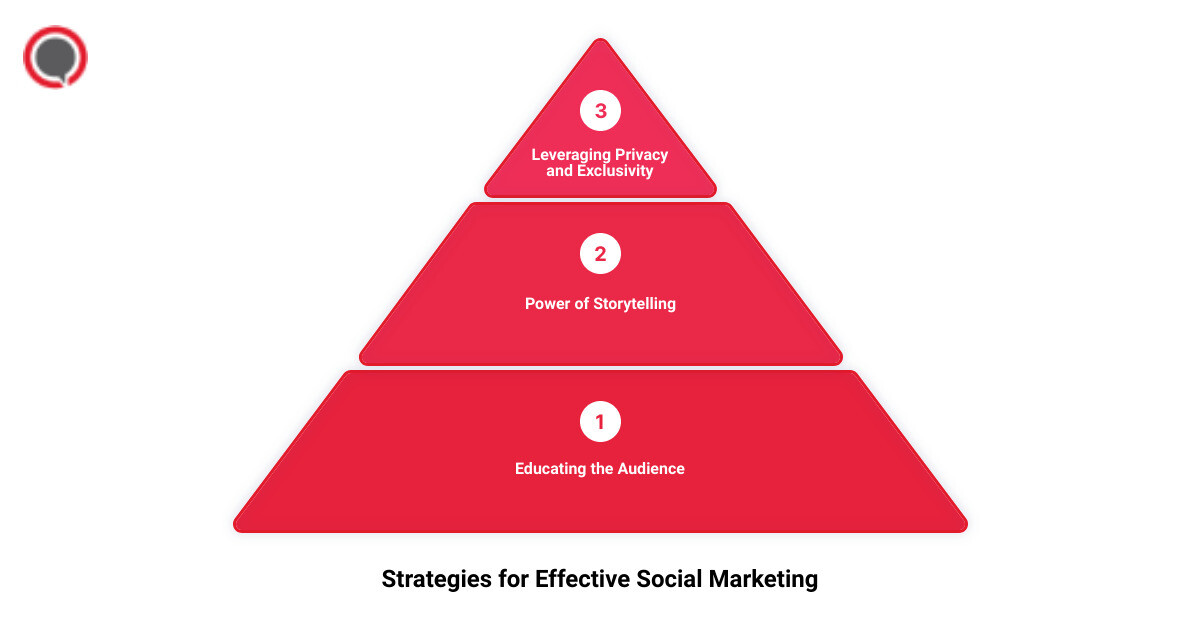Introduction to Social Marketing
In the fast-paced world of digital marketing, a new era is emerging — the era of Social Marketing. This innovative approach takes traditional marketing techniques and repurposes them to effect positive societal change. It's not just about boosting brand visibility or driving sales anymore, but about influencing behavior to benefit individuals and society as a whole. For marketing heads in small to midsize businesses who are looking to make a significant impact online, social marketing is a game-changer. It's not just an option; it's your next strategic move to elevate your digital marketing game.
Social marketing is a systematic and planned process that aims to change or maintain people’s behaviour, which is a stark contrast to the traditional commercial marketing focused solely on boosting sales or brand awareness. It's an approach that requires strategic planning, in-depth audience understanding, and continuous evaluation. This article will delve into the concept of social marketing, its importance in marketing management, and how it can be effectively implemented to achieve the desired results.
Understanding the Concept of Social Marketing
As the digital world continues to evolve, social marketing emerges as a powerful tool for achieving societal change. But what exactly is social marketing, and how does it differ from commercial marketing? Let's demystify these two concepts and understand their role in marketing management.
The Difference Between Social Marketing and Commercial Marketing
Social marketing and commercial marketing are two unique approaches, each with its own set of goals and strategies. Social marketing is an approach that employs marketing tools to bring about positive social change. It emphasizes on promoting social, environmental, and economic issues, such as poverty, hunger, sustainability, education, public health, and global warming. The primary goal is to change people's behavior, raise social consciousness, and promote societal change.
On the other hand, commercial marketing primarily focuses on influencing customers' emotions and decision-making processes to drive sales and generate revenue. It uses marketing and advertising tools to promote products or services with the ultimate goal of increasing profits.
While both approaches aim to influence people, they are fundamentally different. Social marketing appeals to the common good, while commercial marketing appeals to individual wants and needs.
The Role of Social Marketing in Marketing Management
In the realm of marketing management, social marketing plays a significant role in shaping public behavior towards societal and environmental issues. It's a systematic and planned process that requires understanding the target audience, defining the behavioral change desired, and determining how to measure the changes.
Social marketing helps in ensuring that marketing strategies are based on a genuine understanding of people’s lives, making the goals realistic and achievable. It enables marketers to target their resources cost-effectively and select interventions that have the best impact over time.
In essence, social marketing is an effective tool for influencing behavior in a sustainable and cost-effective way, contributing to the overall success of marketing management. By integrating social marketing strategies into their plans, businesses can not only contribute to societal good but also enhance their brand image and credibility in the market.
In the following sections, we'll delve deeper into the importance of social marketing in marketing management and how it can be effectively implemented to bring about meaningful change.

The Importance of Social Marketing in Marketing Management
With great power comes great responsibility. This popular quote resonates perfectly when we talk about the role of marketing in society. Marketing is a powerful tool, and when used right, it can contribute significantly to positive societal transformation. This is where the importance of social marketing in marketing management comes to the forefront.
How Social Marketing Influences Positive Societal Transformation
Social marketing has the power to influence large-scale societal change. By leveraging marketing techniques and strategies, social marketing aims to bring about behavior change for the common good. This approach shifts the focus from the company's profits to the well-being of society. It is not about transforming people's perceptions for the benefit of the company, but rather, it's about encouraging individuals to be more conscious of their environment and act towards its improvement.
For example, social marketing campaigns tackle world's major problems like hunger, poverty, inaccessibility of education, air, water, and noise pollution, global warming, deforestation, loss of biodiversity, and more. Through these campaigns, companies question the status quo, raise important issues, and encourage individuals to change their perspectives and behaviors. By doing so, they contribute to societal good and help improve the quality of life for everyone.
According to statistics, 80 out of 100 adults are ready to contribute to social change. This readiness from the masses coupled with effective social marketing strategies can bring about meaningful transformations in society.
The Value of Social Marketing Defined by the Target Audience
One of the key aspects that sets social marketing apart is its focus on the target audience. In social marketing, the perceived or actual value is defined by the people who are targeted by the marketing intervention. It is not about what the organization assumes to benefit the people; it is about what the people themselves perceive as valuable.
This audience-centric approach is critical because it ensures that the marketing interventions are grounded in the real needs and motivations of the people. It increases the likelihood of the campaign's success and ensures that the societal changes brought about are truly beneficial for the people.
In conclusion, the importance of social marketing in marketing management cannot be overstated. By influencing positive societal transformation and centering the value around the target audience, social marketing plays a crucial role in enhancing the quality of life and contributing to the common good. As we move forward, it will be interesting to see how businesses further incorporate social marketing strategies to drive meaningful societal change.
The Process of Implementing Social Marketing
Embarking on a social marketing campaign is not a spur-of-the-moment decision. It is a systematic, well-planned process that requires understanding, research, and creativity. From identifying the problem and audience to crafting memorable slogans and visuals, each step is crucial to the success of the campaign.
The Systematic and Planned Process of Social Marketing
In the realm of social marketing, spontaneity takes a back seat, and strategy takes the wheel. The process is akin to a roadmap that guides the marketing efforts towards a well-defined goal. The approach revolves around six steps: defining the issue, understanding the audience, creating a strategy, developing engaging content, deciding on the platform, and finally, monitoring and evaluating the campaign. These steps are not standalone; they are interconnected, each one influencing the other, creating a coherent and impactful campaign.
The Importance of Research in Social Marketing
Research is the foundation upon which a successful social marketing campaign is built. It is the tool that provides insight into the problem at hand, the target audience, and potential solutions. The process of creating a robust social marketing strategy begins with identifying your target audience and understanding their behavior. This information is crucial as it guides the messaging and the platforms you choose to use. The more precise your understanding of the audience, the more effective your campaign will be.
In addition to understanding the audience, researching the issue you wish to address is equally important. It involves a comprehensive analysis of the problem's root causes, its impact, and potential solutions. The insights gained from this research inform the strategy and the nature of the content to be created.
The Role of Memorable Slogans and Visuals in Social Marketing
While the systematic process and research form the backbone of a social marketing campaign, the flesh and skin are made up of memorable slogans and compelling visuals. The power of a catchy slogan or a striking visual cannot be underestimated. They grab attention, provoke thought, and most importantly, they leave an imprint in the minds of the audience.
In social marketing, the content should be compelling and offer a clear call to action. However, for the content to resonate with the audience, it needs to be packaged in a way that is engaging and memorable. This is where slogans and visuals come in. They make the message relatable and easy to remember, enhancing the likelihood of the desired action being taken.
In essence, implementing social marketing is a blend of strategy, research, and creativity. It is a systematic process that requires a deep understanding of the audience and the issue at hand, coupled with the power of memorable slogans and compelling visuals. This combination is what makes social marketing a powerful tool in driving positive societal change.
Examples of Successful Social Marketing Campaigns
When theory is put into practice, the real impact of social marketing campaigns begins to shine. Let's explore two powerful examples that have effectively used social marketing to drive change and impact our society in meaningful ways.
Friends of the Earth: Making Areas Climate-Friendly
One such campaign that strikes a chord in the era of climate change is the initiative by Friends of the Earth. This community has dedicated itself to creating climate-friendly spaces, advocating for social justice, and ensuring the protection of nature. They've taken on a multitude of issues, ranging from plastic pollution to the extinction of species. Through their persistent efforts, Friends of the Earth communicates the urgency of these global issues and encourages individuals to contribute towards making a positive change.
Their strategy incorporates a blend of data-driven research to understand their audience, coupled with convincing and impactful messaging. Their slogan, "Protect the Planet, Demand Justice," is a clear call-to-action, urging individuals to stand up for our planet and demand justice for communities suffering from environmental injustices.
Tips From Former Smokers Campaign: Raising Awareness About the Health Consequences of Smoking
Another striking example of a successful social marketing campaign is the Tips From Former Smokers campaign by the CDC’s Office on Smoking and Health. This campaign focuses on individuals who quit smoking due to health problems, revealing the harsh realities that can result from tobacco use.
Unlike traditional anti-smoking campaigns, this initiative provides real-life stories of individuals who have experienced the detrimental health impacts of smoking. The campaign effectively employs visuals, showcasing the physical effects of smoking on these individuals. This potent mix of storytelling and visual representation makes the campaign relatable and impactful, prompting the audience to think twice about their own smoking habits.
The campaign's success can be attributed to a well-researched and targeted approach, focusing on one behavior at a time - quitting smoking. By understanding the audience's behavior and presenting them with hard-hitting realities, the campaign manages to drive behavioral change effectively.
These examples demonstrate how social marketing campaigns can wield the power of strategy, research, creativity, and understanding of the audience to bring about significant social change. By targeting specific behaviors and employing effective techniques to influence these behaviors, social marketing can indeed usher in a new era of marketing management.

Strategies for Effective Social Marketing
As we delve into the new era of marketing management, it's essential to understand that social marketing isn't a one-size-fits-all approach. It requires tailored strategies that resonate with your target audience and align with your campaign goals. Let's explore some of these key strategies.
Educating the Audience: The First Step in Social Marketing
In the realm of social marketing, knowledge is power. The objective is not just to raise awareness but to change or maintain behaviour beneficial to individuals and society. This process begins by educating your audience about the issue at hand. Remember, understanding is the first step towards change. Therefore, your content should not merely inform but also inspire action. It should clearly articulate the problem, its implications, and how the desired behaviour can bring about positive change.
The Power of Storytelling in Social Marketing
Nothing connects people to a cause like a compelling story. Storytelling in social marketing humanizes your campaign, making it relatable and memorable. It's not just about statistics and facts; it's about personal experiences, emotions, and real-life scenarios. Your story should evoke empathy, provoke thought, and inspire action. It should be a narrative that resonates with your audience, making them an integral part of your campaign's journey.
The Role of Micro-Influencer Marketing in Social Marketing
In this digital age, influencers hold significant sway over their followers. Specifically, micro-influencers, who have a smaller but highly engaged audience, can be a potent tool in your social marketing arsenal. They are seen as relatable, trustworthy, and authentic, making them ideal for promoting social causes. Collaborating with micro-influencers can amplify your message, extend your reach, and enhance your campaign's credibility.
Leveraging Privacy and Exclusivity in Social Marketing
Contrary to popular belief, exclusivity can be a valuable strategy in social marketing. By creating exclusive groups or communities, you can foster a sense of belonging among your audience. This strategy can be particularly effective when dealing with sensitive issues that require privacy and discretion. Moreover, offering exclusive access to information or events can incentivize desired behaviours, making your audience feel valued and involved.
In conclusion, effective social marketing requires a blend of audience education, compelling storytelling, strategic influencer collaborations, and the creative use of exclusivity. By employing these strategies, you can craft a powerful social marketing campaign that resonates with your audience and inspires meaningful change. Stay tuned, as up next we'll be exploring some real-world examples of successful social marketing campaigns.

The Future of Social Marketing in Marketing Management
As we delve deeper into the digital age, social marketing is poised to play an increasingly significant role in marketing management. It's not just about selling products anymore but about creating a positive impact within society and the environment. Let's take a closer look at the long-term impact of social marketing and how it improves the quality of life.
The Long-Term Impact of Social Marketing on Society and the Environment
Social marketing is a potent tool that can effect meaningful and lasting change in society and the environment. By encouraging positive behaviors and discouraging negative ones, social marketing campaigns can address pressing social and environmental issues. For instance, campaigns promoting water conservation can contribute to resource sustainability, while those advocating for healthier eating habits can combat obesity and other health issues.
According to the National Social Marketing Centre (NSMC), social marketing's goal is always to change or maintain how people behave, not just what they think or how aware they are about an issue. This focus on behavior change underscores the long-term impact of social marketing. By fostering sustainable behavior changes, we can build a healthier, more equitable, and more sustainable society.
How Social Marketing Improves Quality of Life
Social marketing can also directly improve people's quality of life. By addressing the root causes of societal issues, social marketing campaigns can make a tangible difference in the lives of individuals and communities.
For instance, a campaign promoting the use of child car seats can save lives and prevent injuries. Similarly, a campaign advocating for regular exercise can improve people's physical health and mental well-being.
Moreover, the NSMC emphasizes that the benefits of social marketing interventions are defined by the people targeted by these interventions. This focus on the target audience's perceived benefits ensures that social marketing campaigns are tailored to the needs and values of the people they aim to influence, thereby maximizing their impact.
In conclusion, as we look towards the future of marketing management, it's clear that social marketing will play an increasingly prominent role. By leveraging the power of social marketing, businesses can not only achieve their marketing objectives but also contribute to societal and environmental well-being. This dual focus on business success and societal impact represents the new era of marketing management, where companies are as invested in the welfare of society and the environment as they are in their bottom line.
Conclusion: The New Era of Marketing Management
The new era of marketing management is not just about selling products or services, it's about creating a positive impact on society. This is where social marketing comes into play. As we navigate through the digital age, the role of social marketing in marketing management has become increasingly important. It's no longer about simply broadcasting a message, but about fostering meaningful, two-way conversations that inspire action and bring about change.
Social marketing brings a unique perspective to marketing management by focusing on the needs and wants of the target audience, and not just the needs of the company. It's about understanding the people you're trying to reach, their lifestyle, their values, and their challenges. It's about creating campaigns that resonate on a deeper level, that inspire, that cause a shift in behavior for the betterment of individuals and society as a whole.
Moreover, the future of marketing is becoming more automated and data-driven. This means that social marketers need to be savvy with the latest technological tools, such as automation software, augmented reality, and predictive analytics. These tools can help marketers better understand their audience, create more engaging content, and measure the effectiveness of their campaigns.
But let's not forget the human element. At the heart of every social marketing campaign is a story - a story that connects, that moves, that inspires. Whether you're a small business trying to make a difference in your community or a multinational corporation aiming to address global issues, storytelling is a powerful tool that can spark change and create a lasting impact.
In conclusion, the new era of marketing management is here. It's an era that values authenticity, engagement, and societal impact. It's an era that requires marketers to think outside the box and to put people first. It's an era where marketing is not just about selling, but about serving. It's an era that calls for social marketing.
At SocialSellinator, we understand the importance of this new era of marketing management. We are committed to helping businesses navigate this complex landscape, delivering data-driven strategies that not only achieve business objectives but also contribute to societal and environmental well-being. Visit us today and let's usher in this new era together.





